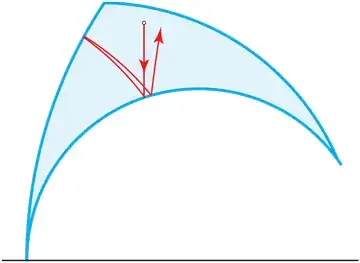It is a theorem of Masur that all rational triangles in the Euclidean plane posses a periodic billiard path, one obeying the reflection law that the angle of incidence equals the angle of reflection. A rational triangle has angles that are rational multiples of $\pi$. It remains an open question of whether all triangles have a periodic billiard path.
Q. Is there some analogous theorem for hyperbolic triangles in the hyperbolic plane?
A billiard path in a hyperbolic triangle consists of geodesics which reflect from the sides of the triangle by the same reflection law. Here is a possible start of a billiard path inside a triangle drawn in the Poincare half-plane model, where the geodesics are circular arcs and vertical line segments:

Is there some analog of the Euclidean rational angle condition that yields a theorem for hyperbolic triangles?